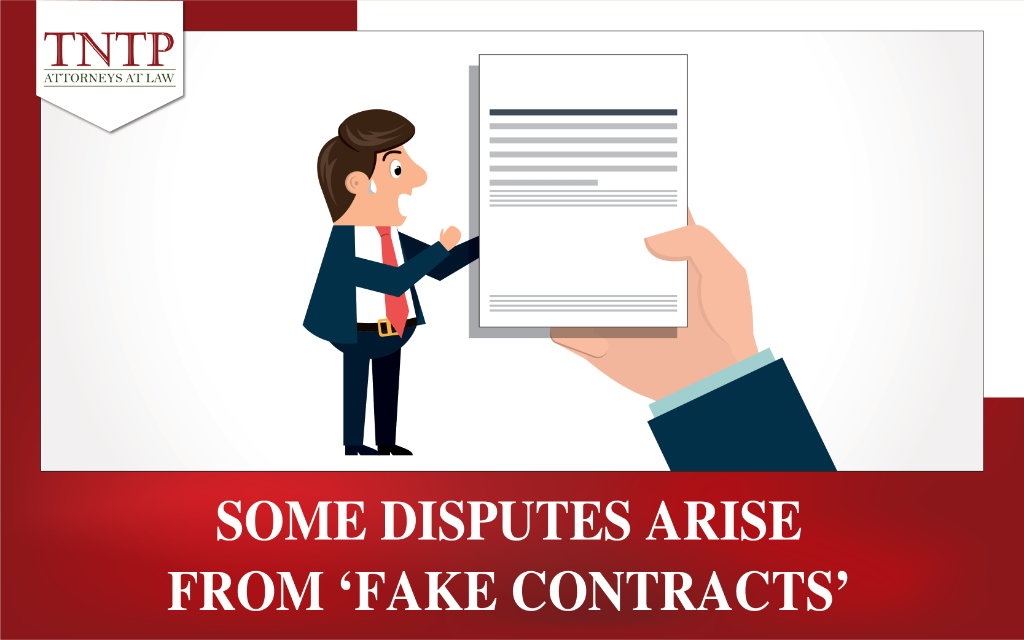Some disputes arise from “Fake contracts”

“Fake Contracts” is a common practice in the modern day, especially in complex economic transactions. However, the nature of Fake Contracts itself carries many legal risks and potential disputes between the parties. In this article, TNTP will analyze some common disputes arising from Fake Contracts.
1. What is a fake contract?
• Current law does not provide a specific concept or definition of Fake Contracts. However, a fictitious contract (hereinafter referred to as “fake contract”) can be understood as a type of contract intentionally created by the parties to conceal another actual transaction. The purpose of this is often to evade legal obligations, minimize tax costs, or achieve other unlawful objectives. Fake Contracts may cover, transfer, gift, or involve other transactions but are represented in a different form.
• The current law does not have detailed regulations on handling Fake Contracts. However, according to Article 124 of the Civil Code 2015, when parties create a fake civil transaction to conceal another civil transaction, the fake transaction is invalid, while the concealed transaction remains valid unless it is also invalid under the law.
Using Fake Contracts may bring short-term benefits to the parties involved but carries many legal risks. The ambiguity in these transactions not only affects transparency but also causes significant loss to the involved parties when disputes arise.
2. Common types of fake contract
• Fake Sales and Transfers: It is used to conceal the actual value of asset transfers to evade financial obligations. For example, during land use rights transfer to avoid financial obligations to the state, parties often create two sales contracts. The fake contracts record a lower transfer value than the actual one to reduce payable taxes and fees.
• Fake Loan Contracts: Fake loan contracts are often used to cover up usurious loans or tax evasion. In such cases, a large loan may be disguised as a loan contract with conditions different from the actual ones. For instance, a person might sign a loan contract to hide a real estate purchase transaction to evade taxes or other legal regulations. Here, the loan contract is merely a facade, while the true purpose is the real estate transaction.
• Fake Lease Contracts: Fake lease contracts might aim to conceal asset transfers or achieve other unlawful objectives. For example, a company might simulate leasing assets to avoid legal regulations on asset transfers.
3. Disputes arising from fake contracts and associated risks
• Disputes on the validity: One of the most common disputes is determining the validity of the contract. When a contract is found to be fake, disputes often revolve around identifying which contract is legal and effective. For example, after concluding a fake contract to conceal a land use rights transfer, one party discovers the land’s value has significantly increased. This party might sue to have the previous contract declared invalid to reclaim the land use rights
• Rights and obligations disputes: When a fake contract is discovered and declared invalid, one of the parties is usually affected, leading to disputes over the parties’ rights and obligations.
• Compensation: In many cases, one party might suffer damages due to the invalidation of a fake contract. When a contract is declared invalid, the aggrieved party often seeks compensation, leading to complex disputes over damage assessment and compensation responsibility.
• Asset misappropriation: Numerous cases involve parties using transfer contracts to conceal loans, with the transferee then misappropriating the mortgaged assets.
The use of Fake Contracts creates significant challenges in dispute resolution. In reality, cases involving Fake Contracts are very difficult to handle, often because the actual purpose agreed upon by the parties is well concealed.
4. Solutions to minimize disputes
• Professional legal advice: Before signing any contract, parties should seek advice from lawyers or legal experts to ensure the contract’s legality and understand potential legal risks. Lawyers can help evaluate contracts, identify inconsistencies, and propose suitable legal solutions.
• Compliance with legal regulations: Adhering to current legal regulations is a prerequisite to avoiding disputes related to Fake Contracts. Parties need to understand and correctly implement regulations on taxes, asset transfers, and other legal obligations.
• Transparent and legal transactions: Transactions between parties should be conducted transparently, clearly, and honestly. This not only helps avoid misunderstandings and future disputes but also builds long-term trust and cooperation between parties.
Fake Contracts are a complex phenomenon with many legal risks. Understanding the nature of these contracts and the potential disputes can help parties in transactions prevent and resolve disputes effectively. Always seek legal expert advice to ensure your rights in every transaction.
This is the article “Some disputes arise from “Fake contracts”” that TNTP sends to our readers. TNTP hopes this article is helpful to you.



